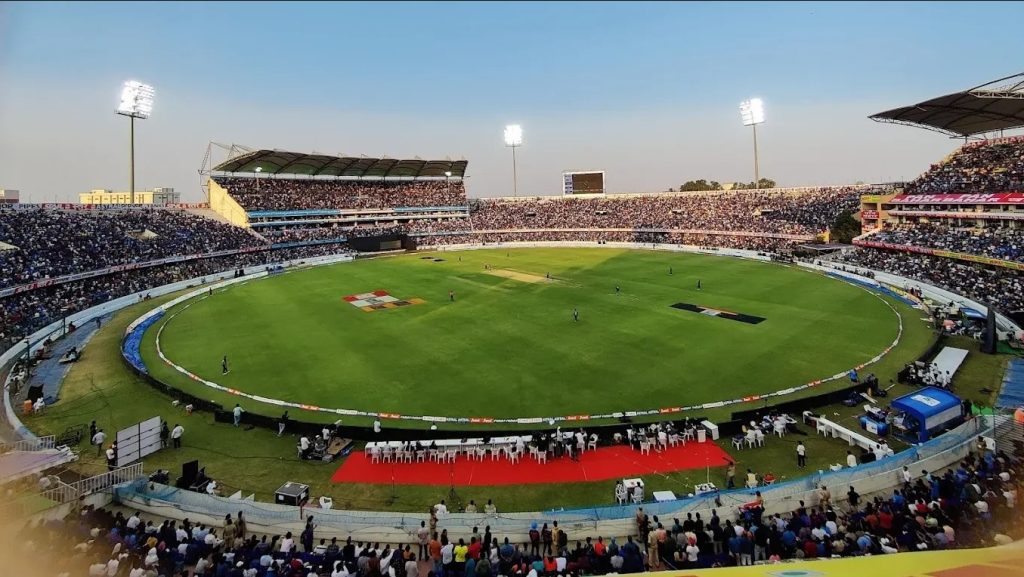Rajiv Gandhi International Cricket Stadium: Cricket in India is more than a sport—it’s a culture, and the stadiums are temples of the game. Among these revered venues stands the Rajiv Gandhi International Cricket Stadium in Uppal, Hyderabad. Known for hosting intense international encounters and IPL thrillers, this stadium is not only famous for its crowd energy and surface characteristics but also for its boundary dimensions, which can significantly influence match outcomes.
Rajiv Gandhi International Cricket Stadium: In this detailed article, we will explore the boundary lengths of the Rajiv Gandhi International Stadium, compare them with other venues, and analyze how these dimensions affect strategies across formats.
1. Rajiv Gandhi International Cricket Stadium: The Stadium and Its Setup
Rajiv Gandhi International Cricket Stadium: Established in 2005 and operated by the Hyderabad Cricket Association (HCA), the Rajiv Gandhi International Cricket Stadium boasts a seating capacity of approximately 55,000. Its oval shape and centralized pitch block allow for symmetrical field dimensions, but actual boundary lengths vary based on the pitch’s location on the square.
Rajiv Gandhi International Cricket Stadium: The stadium has hosted all three formats of international cricket and is home to the Sunrisers Hyderabad franchise in the IPL.
2. Boundary Length: General Dimensions
Rajiv Gandhi International Cricket Stadium: Like most international stadiums, the boundary dimensions in Hyderabad are dynamic. Depending on the pitch used (center, off-center), and the format being played, the boundaries can be adjusted.
Typical Boundary Lengths at Rajiv Gandhi Stadium:
| Boundary Area | Minimum Length (m) | Maximum Length (m) | Average (m) |
|---|---|---|---|
| Straight (Long-on/off) | 68 | 74 | 71 |
| Square (Point/Midwicket) | 63 | 71 | 67 |
| Fine Leg/Third Man | 60 | 66 | 63 |
| Deep Extra Cover/Midwicket | 68 | 75 | 71.5 |
Note: ICC mandates a minimum boundary distance of 59.43 meters (65 yards) from the center of the pitch.
Rajiv Gandhi International Cricket Stadium: The layout of the ground ensures no area is unusually short, offering balanced opportunities for both bat and ball.
3. Pitch Position & Boundary Variations
The pitch block at Hyderabad includes multiple surfaces, which can shift the field dimensions based on which strip is in use.
Pitch Position Impact on Boundaries:
| Pitch Position | Square Boundary | Straight Boundary | Typical Format |
|---|---|---|---|
| Center Pitch | ~68 m (balanced) | ~71 m (standard) | Test, ODI |
| Off-Center Left | ~63 m (short side) | ~74 m (long straight) | T20, IPL |
| Off-Center Right | ~71 m (deep square) | ~68 m (short straight) | T20 with high scoring |
In T20 games, curators often use side pitches to create one short boundary, encouraging big hits and dramatic chases.
4. Comparison With Other Indian Stadiums
How does Hyderabad compare to other Indian grounds?
| Stadium | City | Avg. Square Boundary (m) | Avg. Straight (m) | Scoring Nature |
|---|---|---|---|---|
| Rajiv Gandhi Intl. Stadium | Hyderabad | 67 | 71 | Balanced |
| Eden Gardens | Kolkata | 66 | 69 | Slightly batting-friendly |
| Wankhede Stadium | Mumbai | 63 | 67 | High scoring |
| Narendra Modi Stadium | Ahmedabad | 73 | 75 | Bowler-friendly when large |
| M. Chinnaswamy Stadium | Bengaluru | 60 | 64 | Very batting-friendly |
Hyderabad stands out as neither too small nor overly large, making it a fair contest venue.
5. Impact of Boundary Length on Game Strategy
a) In T20 Matches
Hyderabad has hosted many IPL classics. With moderate boundaries, teams can’t rely on brute power alone and must balance risk with placement.
Strategy Insights:
- Batsmen often aim for straight hits.
- Bowlers use the larger square boundaries to trap players into mistimed shots.
- Fielding sides adjust by having two deep square riders or a wide long-off.
IPL Example: High-Scoring Game
| Match | Format | Total Sixes | Avg. Boundary Length |
|---|---|---|---|
| SRH vs RCB, IPL 2019 | T20 | 19 | 67.5 m |
| SRH vs KKR, IPL 2023 | T20 | 24 | 66.8 m |
Despite the moderate sizes, hitters like David Warner, Nicholas Pooran, and Glenn Maxwell have thrived here due to strong timing and gap selection.
b) In ODIs
ODIs at this stadium often offer true bounce, and the outfield is quick, meaning even mis-hits can travel to the fence. But the boundaries aren’t as tiny as Chinnaswamy or Wankhede, so players often need to work the angles more.
| Match | Team Score | Sixes Hit | Result |
|---|---|---|---|
| IND vs AUS, Jan 2023 | 209/2 (Chase) | 6 | India won |
| NZ vs PAK, ICC WC 2023 | 401/6 | 12 | NZ won |
Here, rotation of strike and boundary pacing are key to scoring big.
c) In Test Matches
- Spinners can set traps with in-out fields.
- Seamers use width outside off to induce false shots.
- Batters need to place their shots well; clearing the ropes takes commitment.
| Notable Match | Result | Top Bowler | Avg. Boundary (m) |
|---|---|---|---|
| IND vs AUS, 2023 (Test) | India won by inns | R. Ashwin (8 wickets) | 68.5 |
6. Field Placement Dynamics Based on Dimensions
| Boundary Side | Common Fielding Positions | Bowling Adjustment |
|---|---|---|
| Short Square Side | Deep square leg, deep point | Slow bouncers, cutters |
| Long Straight Side | Long-on, long-off, wide mid-off | Full length, yorkers, slower balls |
| Off Side (deep cover) | Deep extra cover, sweeper cover | Wide lines, slower pace |
| Leg Side (deep midwicket) | Deep midwicket, backward square | Target bodyline or leg-stump yorkers |
Captains often adjust fields with precise knowledge of boundary shapes to cut off boundaries and force risky shots.
7. Fan Experience and Stadium Design
From the stands, boundary distances influence the visual feel of the game:
- Mid-sized boundaries offer regular excitement (frequent fours/sixes).
- Fans are close to the action, especially in lower tiers.
- The architecture allows symmetry, so no part of the ground feels awkward or too stretched.
With LED floodlights, huge scoreboards, and ample seating, the stadium is as much a spectacle as the cricket itself.
8. Evolution of Boundary Dimensions Over the Years
| Year | Change Noted | Impact |
|---|---|---|
| 2006 | Initial setup, larger boundaries | Lower scoring matches |
| 2012 | Slight reduction for IPL | Higher scoring trends |
| 2023 | Balanced dimensions post-renovation | Fair contests across formats |
Balanced, Tactical, and Unpredictable
The Rajiv Gandhi International Cricket Stadium offers a perfect blend of playable boundary lengths and strategic complexity. Not too large to kill the thrill, yet not too short to make bowling irrelevant, Hyderabad provides a pitch where technique meets tactics.
Its moderate boundaries have shaped memorable IPL finishes, high-scoring ODIs, and disciplined Test spells. As cricket evolves, Hyderabad continues to offer the kind of boundary dynamics that keep players guessing and fans cheering.
Whether you’re a batter eyeing the sightscreen or a bowler plotting a trap on the square boundary—at Uppal, every meter matters.


